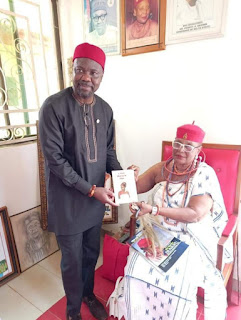Tribute: Honouring Obi Martha Dunkwu for Her Revolution of Anioma's Omuship
As a professional historian who has dedicated the last 29 years of my life to bringing the culture of the Anioma people to the attention of the world, I feel that I was at least somewhat qualified to collaborate closely on Anioma advocacy with the late Omu revolutionist, HRM Obi Martha Dunkwu, the Omu of Anioma, and that is exactly what happened in the end. December 14, 2014, was a routine day for us. At the time, the Anioma Personality of the Year Planning Committee was run by the Anioma Trust publi
cation, and I served as its chairman. However, the Committee had already chosen HRM Obi Martha Dunkwu as the recipient of the year's prestigious award, and it allowed me to meet her for the first time. With warm familiarity created, we began to enjoy close relationships subsequently.
In 2016, I followed it up with the authorship of a history book on the institution, titled "A Short History of Omu: An Account of a Female Traditional Institution in Anioma," which now happens to be the only published book on Omuship. I approached her to do the foreword of the book since she was a custodian of the institution and one who had contributed to the global progress of our people's culture, and she graciously accepted the proposal. On publishing the book, which started to make global sales in promotion of the people's institution, we both realized that there was a lot we had in common and sought a dual conscious and conscientious need to work together to promote Omuship to the world. A few years later, HRM Obi Martha Dunkwu requested that I do a second comprehensive edition of the book, which I graciously accepted. With arrangements perfected with foreign scholars who had also shown interest in the work, I began to gather my sources, hoping that the project would take off while Omu was also hoping to commit her finances, but death suddenly struck, putting an end to our collective aspiration.
I found in Omu Martha Dunkwu remarkable cultural enthusiasm, genuine and determined conviction, relentless efforts to achieve advocacy, and also the intellectual capacity necessary to make headway, and I immediately understood that the Anioma region had become blessed with an arrowhead to pursue the Anioma cultural cause indomitably. On the assumption of the ancient stool, HRM Obi Martha Dunkwu met five elderly Omu, but this number was to increase to a total of 15 due to efforts to protect the institution as a viable socio-cultural vehicle for the promotion of female ideals in our society. In the revolution of the return of Omuship, which started to envelop the Enuani region, Akwukwu-Igbo, Ugbolu, Obomkpa, Issele-Uku, Ugbodu, Ibusa, and others re-birthed Omuship in their various communities. To further unite the Omu from the various communities to enable them to carry out their expected tasks in the name of Anioma, HRM Obi Martha Dunkwu established a platform, and positions were assigned to the different Omu. I received the appointment of the Research Consultant to the Council.
The Omu was hailed for conceivably making Anioma a small village by using the Omuship as an instrument. In 2021, the Omu designated a structure in her Okpanam Palace for the establishment of the Centre for Omuship, which we went ahead to register with the Corporate Affairs Commission (CAC) with her humble self, HRM Obi Kikachukwu, JP, the Obi of Ubulu-Unor, Dr. Afamefuna Dunkwu-Okafor (her son), Mr. Patrick Ochei, Mr. Godfrey Osakwe, and myself (Dr. Emeka Esogbue) as Trustees. Omu Martha Dunkwu was an extremely patient leader who, despite initial criticism of her Omu of Anioma installation, determinedly carried on with the dictates of the hitherto unknown cultural office until she won back her critics with a remarkable performance.
This happened because, as I noticed, she was not one to be swayed outside her well-intended conviction. She continued to surmount every obstacle challenging the institution. By tradition, the Omu was not permitted to work and was not also a businesswoman. Omu Martha Dunkwu was supposed to stay in charge of a market in Okpanam, from which she was expected to make economic gains, but the market was no more. She was not a government contractor, and she was never remunerated by the government. Despite this precarious life of an Omu, she continued to fund her projects in her service to the Anioma people in particular and Delta State in general until her last breadth. Having returned to her father's house to live as Omu all the days of her life, no one knew when she was indisposed or thought of drugs for her, but she strived to live.
The life of the Omu is an isolated one after all. We shared a mother-son relationship, which also bound me to Okpanam and her people and gave me the understanding that the Enuani people share a commonality of destiny and that relatives could abound outside one's immediate family. She was a mother to all without borders, entirely honest, bold, and full of love, friendliness, and fondness. I am persuaded to believe that being our gift to the world, the footprints, feats attained, and global acknowledgment leave HRM Obi Martha Dunkwu as the greatest Okpanam indigene that ever lived, but only second to Major Chukwuma Nzeogwu and perhaps the best female to come from that community. We shall continue to pray for the Almighty God to bless us with another HRM, Martha Dunkwu, who will project us to the world.
May the Anioma matriarch travel well!
Dr. Emeka Esogbue,
Historian and Former Research Consultant to the Council of Omu

Comments
Post a Comment